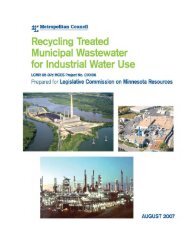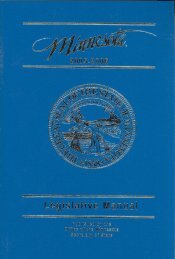Minnesota Board of Pharmacy - Minnesota State Legislature
Minnesota Board of Pharmacy - Minnesota State Legislature
Minnesota Board of Pharmacy - Minnesota State Legislature
Create successful ePaper yourself
Turn your PDF publications into a flip-book with our unique Google optimized e-Paper software.
qualified to carry out the duties <strong>of</strong> a pharmacy technician;<br />
• regulate and define additional substances, not listed in the statutes, which contain<br />
quantities <strong>of</strong> a substance possessing abuse potential and add them to the appropriate<br />
controlled substance schedule in rule;<br />
• add substances to or delete or reschedule substances listed in the controlled substance<br />
schedules, by rule;<br />
• coordinate the state’s schedules <strong>of</strong> controlled substances with the federal schedules;<br />
• administer the <strong>Minnesota</strong> Prescription Monitoring Program.<br />
Although the other health licensing boards are also engaged in licensing, complaint investigation,<br />
disciplinary activities and (in some cases) inspections, they have jurisdiction over pr<strong>of</strong>essions different<br />
than those for which the <strong>Board</strong> has jurisdiction. Thus none <strong>of</strong> the functions <strong>of</strong> the <strong>Board</strong> overlap or<br />
duplicate those <strong>of</strong> other agencies.<br />
Most <strong>of</strong> the health licensing boards handle licensure examinations by working with national<br />
organizations that develop and administer examinations. Many <strong>of</strong> the boards use licensure transfer<br />
programs administered by those same organizations. In the case <strong>of</strong> the <strong>Board</strong> <strong>of</strong> <strong>Pharmacy</strong>, the<br />
organization is the National Association <strong>of</strong> <strong>Board</strong>s <strong>of</strong> <strong>Pharmacy</strong> (NABP). The NABP developed and<br />
periodically updates two psychometrically validated pharmacist licensure examinations – the North<br />
American Pharmacist Licensure Examination and the Multistate <strong>Pharmacy</strong> Jurisprudence Examination.<br />
In addition, NABP administers the Licensure Transfer Program that allows pharmacists to more easily<br />
become licensed in a different state.<br />
Consolidating all <strong>of</strong> the health licensing boards into a single, “umbrella” organization would almost<br />
certainly result in no costs savings or increases in efficiency. The boards all regulate different<br />
pr<strong>of</strong>essions and work closely with different national organizations. Consequently, the licensing<br />
processes used by one board resemble, but are not identical, to the processes used by the other boards.<br />
In addition, due to the budget problems faced by all state agencies, the boards have not always<br />
expanded staff to keep pace with increased licensing activities. In the case <strong>of</strong> the <strong>Board</strong> <strong>of</strong> <strong>Pharmacy</strong>,<br />
licensing staff has sometimes had to work overtime during peak licensing periods. For these reasons,<br />
consolidation <strong>of</strong> the boards would not result in a decrease in the number <strong>of</strong> staff members working on<br />
licensing.<br />
Similarly, most states that place health licensing boards into an umbrella organization continue to<br />
employ individuals to administer and staff the individual boards. Those individuals have policy<br />
expertise in the area regulated by the board they administer. Those states also continue to employ<br />
individuals to serve as inspectors and complaint investigators. Consequently, consolidation <strong>of</strong> the<br />
boards would likely not result in a decrease in the number <strong>of</strong> staff members employed by the boards.<br />
To the contrary, consolidation might very well introduce a new layer <strong>of</strong> bureaucracy – the upper-level<br />
management and staff necessary to supervise the umbrella organization as a whole.<br />
These conclusions are supported by a report prepared in 2003 at the request <strong>of</strong> <strong>Minnesota</strong>’s health<br />
licensing boards. (A copy <strong>of</strong> that report, which is titled Health Licensing <strong>Board</strong>s and Governance<br />
Structure, will be provided to the Commission). The author concluded that the literature review and<br />
research she did to prepare the report supported some <strong>of</strong> the <strong>Minnesota</strong> Legislative Auditor’s (OLA)<br />
1999 findings, namely: “We found no convincing evidence that any particular organizational<br />
arrangement or process provides an assured solution to any given problem associated with occupational<br />
regulation.”<br />
32

















